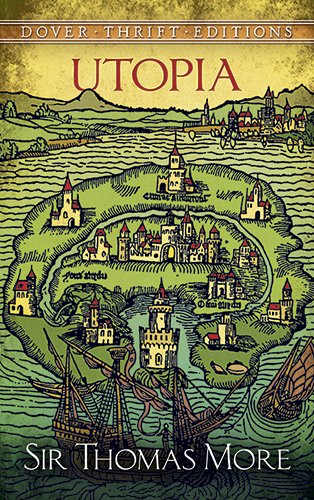Sci-fi scholars draw inspiration from Utopia study
 0 Comment(s)
0 Comment(s) Print
Print E-mail Xinhua, December 4, 2016
E-mail Xinhua, December 4, 2016
|
|
|
"Utopia" written by Thomas More (file photo) |
The island called Utopia created 500 years ago and the futuristic outer space, which seem far away from each other, came together at a conference on Saturday in Beijing.
The International Conference of Utopian and Science Fiction Studies, which runs on Saturday and Sunday, is held to celebrate the 500th anniversary of the publication of "Utopia."
In 1516, English philosopher and writer Thomas More published his famous book "Utopia," depicting an almost perfect fictional island society, and the term has been widely used and discussed since then.
Among various anniversary activities around the world this year, the conference in Beijing commemorates the well-known novel in a special way by discussing it together with sci-fi works, with the participation of experts and scholars from China, the United States and Japan.
While Utopia is always regarded as a political and philosophic concept, and science fiction normally focuses on technologies, Kim Stanley Robinson, an American sci-fi author famous for his "Mars trilogy," said at the conference that the two are connected naturally.
According to Robinson, Utopia was initially set on an isolated island, and such a background could not be used anymore after the world was completely explored, so the background had to be switched to the future.
"Utopia becomes a kind of sci-fi -- or you could say it always was," said Robinson.
Guo Changbao, dean of the School of Chinese Language and Literature of Beijing Normal University (BNU), said the vast space inspired by Utopia would bring meaningful perspectives for China's science fiction and its studies.
"We believe it is necessary to let the two fields of Utopia and sci-fi studies communicate and learn from each other," said Guo.
While decades ago science fiction was regarded as children's and juveniles' books by many in China, more academic studies on it began to appear in recent years, as Chinese science fiction has experienced a flourishing development.
"It is a trend that sci-fi is getting more serious in China," said Wu Yan, director of the Science Fiction Creativity Research Center of BNU and also a sci-fi expert.
During the conference, the last session on Sunday will be discussing "The Three-body Problem" written by Chinese author Liu Cixin. The first part of the trilogy won the 2015 Hugo Award for Best Novel and the trilogy has become a hit in both China and overseas.
Established in 1953, the Hugo Awards acknowledge the best works of science fiction or fantasy and are seen as the top prizes in the genre along with the Nebula Awards.
After Liu became the first Asian to win the Hugo Award, this year, Hao Jingfang, another Chinese writer, won the award by her sci-fi "Folding Beijing," further raising the public's attention on science fiction in China.
Robinson said the rapid development of Chinese science fiction is due to the realistic scientific, economic and cultural development that has taken place in China and "because Chinese people feel like their nation is part of world history and is making the future."
"We are embracing the spring of Chinese sci-fi," Wu said, adding that Chinese sci-fi had both its audiences and authors growing evidently over the last five years, making it no more an indie genre enjoyed only by a few people.
Acting together with China Science Writers' Association as leading sponsors of the conference, the School of Chinese Language and Literature of BNU has been playing a leading role in China's sci-fi development.
It has set up doctoral degrees for sci-fi studies and been providing courses on sci-fi writing, and is planning for more writing courses for interested students.
"Now as a principle and study field, sci-fi is not well developed yet in China, but the space for development is huge," said Guo. "We hope to have more outstanding Chinese sci-fi writers appearing in the future."







Go to Forum >>0 Comment(s)